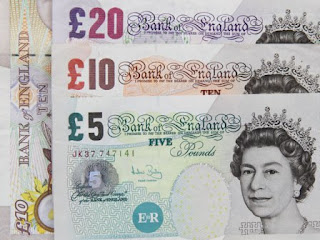I recently returned from a two week trip that took me to four different countries within the European Union. Did you know that only 17 of the 27 EU countries utilize the euro as their official currency? Ireland is part of that group known as the eurozone, just in case you were wondering. Anyway, of the four countries I visited only one of them used the euro. So I had to keep up with four different kinds of money!
In England it was the British Pound
In Denmark it was the Danish Kroner (crown)
in the Czech Republic it was the Czech krona
and in Germany the Euro!
Isn't it so fun and colorful?! Kind of looks like monopoly money, especially in Prague where the conversion rate from Czech Krona to USD was roughly 17 to 1, and the banknotes come in denominations up to 5000! Unfortunately, as fun and colorful as it is this is not monopoly. It is quite real, and it spends just like any other money!
Unlike Prague however, if you're traveling to any of the 17 eurozone countries your dollar won't go quite as far. Today's conversion rate is 1 EUR = 1.44 USD. Obviously the rate will vary from day to day but it certainly has not changed dramatically since we moved here six months ago, so don't hold your breath if you are planning a trip any time soon.
Hopefully you won't let a poor exchange rate stop you from taking an amazing holiday! If you suck it up and make it over the pond chances are you are going to need some cash. Once you step foot off the plane and clear customs you have two immediate options for procuring some green, or do they call it color?
Option one is the currency exchange booth, but I would suggest skipping directly to option two as currency exchange booths typically have the worst exchange rates.
 |
| Avoid Currency Exchanges at the Airport! |
Option two is locating an ATM. Make sure it is a bank owned and operated ATM and not a commercial one that charge crazy extra fees.
 |
| In Ireland these are a few of the reputable banks when looking for an ATM |
Of course it's nearly impossible to avoid extra fees, but if you check with your bank or credit card companies before leaving you can determine which option is best and incurs the lowest fees. Additionally, contacting your bank and credit card company before you go protects you from having a hold put on your card if unusual spending patterns are detected to protect against fraud.
Options three for obtaining euro lie outside of the airport. Option three is to walk into a brick and mortar bank and exchange money at the counter. Even banks charge fees, so be sure to check with the teller if the rate is any lower for exchanging larger amounts.
I love checking out foreign currency. It is just so different than in the states. I often find my wallet getting heavy because I end up with so many one and two Euro coins. While we have silver dollar coins in the states, they are rarely used and fairly large. Over here they're about the size of a quarter although slightly thicker; and sometimes they get tossed in my change purse and I forget I actually have a fair amount of money in my wallet even if I don't have any banknotes.
Cash however is not your only option when it comes to spending money in Europe, like the rest of the world major credit cards are accepted most places. However, in Ireland the chip-and-PIN system for credit and debit cards is the norm. These cards are embedded with a microchip, and when making a purchase you must enter a PIN in order to authorize the transaction. While this is wonderful for Europeans making secure purchases, it can be a big pain in the rear for Americans. Some machines simply don't accept US credit cards. Often you will need to inform the clerk that your card is a swipe, and even then you still may be asked to enter a PIN.
When using credit cards don't be fooled by merchants who offer to convert the bill to USD. While it seems like they are doing you a favor, you actually end up paying more because you have added yet another middle-man. So you are paying the merchant for the conversion service in addition to paying foreign transaction fees to your credit card company!
Bottom line is most hotels, restaurants, and shops that serve Americans accept US credit cards, with or without a PIN number. However, when traveling to smaller cities and towns, and visiting smaller shops, cash may be the preferred and best option.
Tried to keep this post short, but money is an important topic to cover when considering travel plans! Hope it helps prepare you for any upcoming plans you may have. But the best thing you can do to prepare for a trip to Europe where money is concerned is start saving! Especially if you're coming to Ireland. Being an island country makes things just that much more expensive than mainland Europe, or even the UK.










I find it fascinating how different currencies have unique designs.
ReplyDelete